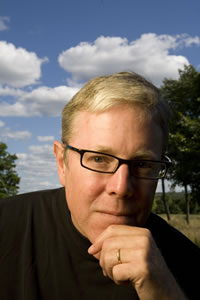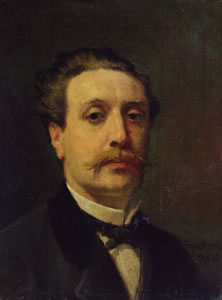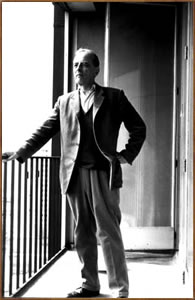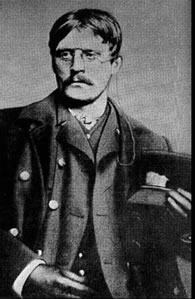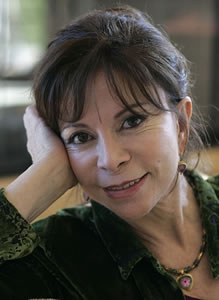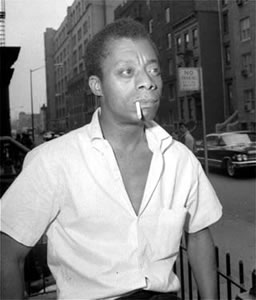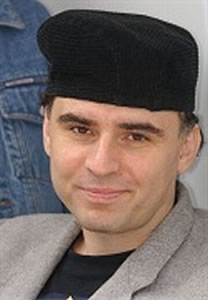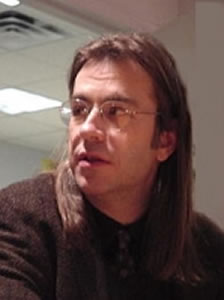De Duitse dichter, schrijver, cabaretier en schilder Joachim Ringelnatz (eig. Hans Bötticher) werd geboren op 7 augustus 1883 Wurzen bij Leipzig. Zie ook alle tags voor Joachim Ringelnatz op dit blog.
Ein Taschenkrebs und ein Känguruh
Ein Taschenkrebs und ein Känguruh,
Die wollten sich ehelichen.
Das Standesamt gab es nicht zu,
Weil beide einander nicht glichen.
Da riefen sie zornig: “Verflucht und verdammt
Sei dieser Bürokratismus!”
Und hingen sich auf vor dem Standesamt
An einem Türmechanismus
Heimatlose
Ich bin fast
Gestorben vor Schreck:
In dem Haus, wo ich zu Gast
War, im Versteck,
Bewegte sich,
Regte sich
Plötzlich hinter einem Brett
In einem Kasten neben dem Klosett,
Ohne Beinchen,
Stumm, fremd und nett
Ein Meerschweinchen.
Sah mich bange an,
Sah mich lange an,
Sann wohl hin und sann her,
Wagte sich
Dann heran
Und fragte mich:
“Wo ist das Meer?”
Wie mag er aussehen?
Wer hat zum Steuerbogenformular
den Text erfunden?
Ob der in jenen Stunden,
da er dies Wunderwirr gebar,
wohl ganz — oder total — war?
Du liest den Text. Du sinnst. Du spinnst.
Du grinst – “Welch Rinds” – Und du beginnst
wieder und wieder. Eisigkalt
kommt die Vision dir “Heilanstalt”.
Für ihn? Für dich? – Dein Witz erblaßt.
Der Mann, der jenen Text verfaßt,
was mag er dünkeln oder wähnen?
Ahnt er denn nichts von Zeitverlust und Tränen?
Wir kommen nicht auf seine Spur.
Und er muß wohl so sein und bleiben.
Auf seinen Grabstein sollte man nur
den Text vom Steuerbogen schreiben.

Joachim Ringelnatz (7 augustus 1883 – 17 november 1934)
De Duitse dichter, schrijver en filmmaker Michael Roes werd geboren op 7 augustus 1960 in Rhede. Zie ook alle tags voor Michael Roes op dit blog.
AL-KUDS
Die Wunde, die nicht blutet, tötet
und das Wort, das nicht fällt, erstickt
Der Gestellte verweigert die Ausweisung
die geschulterte Last Herkunft und Ziel
Gäbe der Pflichtbewußte mit Gott sich zufrieden
doch verehrt die Ikone mit Stiefeln
Saurer Wein hätte gewarnt, die grundlosen
Freudentriller, die brennenden Reifen
In der Ferne der heilige Berg, rauchend
Halde aus Seife und Fischmehl
TEIRESIAS
Frauen sind keine blutenden Vögel
und schlüge eine von ihnen
uns eine Wunde, es träte
nur Wasser heraus
Nie haben sie mir Treue geschworen
noch tat ich ihnen diesen Schwur
Wir haben einander nichts vorzuwerfen
Wäre ich Frau, wäre ich
Nymphe. Auch die Gewalt liebte ich
die schweigsame, wegwerfende Geste des
Mannes, den gewaltsam geöffneten Mund
Doch einmal werden wir Männer
Frau sein, bluten vor Scham, vor
Schande, jemandes Schatten

Michael Roes (Rhede, 7 augustus 1960)
De Australische schrijver John Birmingham werd geboren op 7 augustus 1964 in Liverpool, Engeland. In 1970 emigreerden zijn ouders naar Australië. Hij begon al met publiceren op de University of Queensland. Zijn bekendste werk is He Died With A Felafel In His Hand uit 1994. Van dit boek werd een toneelstuk gemaakt, een film en ook een stripboek. In 1997 verscheen The Tasmanian Babes Fiasco. Andere werken van hem zijn The Search for Savage Henry, How To Be A Man en Off One’s Tits. Voor Leviathan: the unauthorised biography of Sydney ontving hij in 2002 de National Prize For Non-Fiction.
Uit: Without Warning
„Pitié-Salpêtrière Hospital, Paris
The killer awoke, surrounded by strangers. An IV line dripped clear fluid through a long, thick needle punched into the back of her right hand. Surgical tape held the silver spike in place and tugged at the fine blond hairs growing there. The strangers—all women—leaned in, their faces knotted with anxiety, apparently for her. But she stared instead at her hands, which lay in her lap on a thin brown blanket. They looked strong, even masculine. She turned them over, examining them. The nails were cut short. Calluses disfigured her knuckles, the heels of both palms, and the sides of her hands, from the base of both little fingers down to her wrists. The more she stared, the more unsettled she became. Like the women gathered around her bed, those hands were completely alien to her. She had no idea who she was.
“Cathy? Are you all right?”
“Nurse!” somebody called out.
The strangers, three of them, seemed to launch themselves at her bed, and she felt herself tense up, but they simply wanted to comfort her.
“Doctor. She’s awake,” one of them said in French.
She felt soft hands patting her down, stroking her the way you might comfort a child who’s suffered a bad fright. Cathy—that wasn’t her name, was it?—Cathy tried not to panic or to show how much she didn’t want any of these women touching her. They looked like freaks, not the sort of people she’d want as friends. And then she remembered. They weren’t her friends.“

John Birmingham (Liverpool, 7 augustus 1964)
De Russische schrijver Vladimir Sorokin werd geboren op 7 augustus 1955 in Bykovo bij Moskou. Zie ook alle tags voor Vladimir Sorokin op dit blog.
Uit: The Queue (Vertaald door Sally Laird)
“—He’s just got back from America.
—And how was it?
—Depends… There’s an awful lot of crime. You can’t really go out after eight in the evening… There’s loads of stuff around to buy, but you have to work like a horse.
—Of course. Can’t get anything for nothing.
—Here at least you can walk round the streets at night.
—I wouldn’t speak too soon. Just in the last two years we’ve had two murders round our house. And robbery.
—Just coincidence.
—Oh yeah, you reckon!
—The point is Americans are always scared about something—frightened they’ll be kicked out of their job or their wife’s going to get raped or their car stolen…they’re scared stiff the whole time…
—Still, they don’t have these queues.
—No, they don’t have the queues, that’s true.”

Vladimir Sorokin (Bykovo, 7 augustus 1955)
De Nederlandse dichter en prozaïst Cees Buddingh’ werd op 7 augustus 1918 geboren in Dordrecht. Zie ook alle tags voor Cees Budding’ op dit blog.
De bozbezbozzel
De bozbezbozzel lijkt wat op
Een jenk, maar heeft een klein’re kop.
Zijn poten staan steeds twee aan twee
Als eenmaal bij het stekelree.
Hij hinnikt als een maliepaard,
En als het sneeuwt heeft hij een staart.
Wanneer die staart zijn kop zou zijn,
Was hij precies een spieringzwijn.
En als hij zeven staarten had,
Een kossosale kolbakrat.
Nu lijkt hij nog het meeste op
Een jenk, maar met een klein’re kop.
Eight days a week
als mijn vrouw met de bus naar de stad gaat
hoop ik altijd dat ze halte ziekenhuisplein instapt:
dan kan ik haar net zolang nakijken
als wanneer ze halte vogelplein neemt
en zie ik haar bovendien nog een keer
voorbijkomen in de bus

Cees Budding’ (7 augustus 1918- 24 november 1985)
De Amerikaanse schrijver en radiomaker Garrison Keillor werd geboren op 7 augustus 1942 in Anoka, Minnesota. Zie ook alle tags voor Garrison Keillor op dit blog.
Uit: A Lutheran’s Guide to the Orchestra
“Nobody goes into choir music for the wrong reasons. But orchestra… do you know what you’re getting into? You’re getting into oper
a for one thing. Don Juan and Mephistopheles, pagan goddesses screeching and being strangled and thrown off balconies. And even if you stick
to concert music, where are the Christian composers? Modern ones are existentialists, the romantics were secular humanists, the 18th century was all rationalists, and the 17th were Italian except for Bach. And you can’t make a living playing Bach. In the Bible, we read about people singing and playing musical instruments, including the harp, the last trump, the cymbal, the psaltery. But in the Bible, music was in praise of the Lord, not for amusement. We don’t read that our Lord Himself ever played an instrument or enjoyed hearing other people play theirs. The apostles did not attend concerts. They weren’t in the arts – maybe there’s a reason for that. You play in an orchestra, you’re going to be devoting your life to music that sort of swirls around in spiritual mystery. Searching for answers that people could find in the Epistle to the Romans if somebody just showed them
where it is.“

Garrison Keillor (Anoka, 7 augustus 1942)
De Oostenrijkse schrijver en dichter Heinz Rudolf Unger werd geboren op 7 augustus 1938 in Wenen. Zie ook alle tags voor Heinz Rudolf Unger op dit blog.
Uit: Zwölfeläuten
„Von der Bergseite her stapft der Förster heran, ein einsamer Jäger in weißer Wildnis. Sein deutscher Wolfshund hat die Tollwut gekriegt, von den Füchsen, diesem Gesindel. Und es gibt keine rassereinen Jagdhunde mehr in der Gegend, nur noch irgendwelche Rattler, Mischlinge ersten und zweiten Grades. Er biegt um die Kirchhofmauer und hält das Jagdgewehr schußbereit in der Hand, den Jägerblick, scharf wie ein Jagdhund, auf die Schrittspuren gerichtet. Grad waren sie noch deutlich, aber an der Mauer verlieren sie sich, alles zerstampft. „Viel zu viel Füß“, flucht er.
Der Pfarrer Glashüttner fährt herum: „Fichtelhuber! Bist nicht beim Begräbnis?“
„Mein Beileid“, sagt der Förster kalt. „Das da ist wichtiger!“
Der Pfarrer folgt seinem Blick, sucht im Matsch, was da wichtiger sein könnte, findet nichts.
„Das da“, sagt der Förster, „ist viel wichtiger, das ist kriegswichtig, Pfarrer!“
Der Pfarrer versteht nichts. „Was denn, um Himmelswillen?“
Der Förster deutet mit dem Gewehrlauf in den Schnee: „Partisanen! Und die Spuren führen bis ins Dorf!“
Mit einer gewissen Genugtuung sieht er den Pfarrer Glashüttner erbleichen. Der bringt kein Wort heraus, sieht aus, als suche er nach einem passenden Bibeltext. „Ich muß jetzt zum Begräbnis“, sagt er schließlich und will davon.
„Der Ortsvorsteher muß her“, fordert der Förster. „Sagen Sie ihm, etwas enorm Wichtiges wär passiert, und daß er sofort kommen soll!“
Der Pfarrer bockt: „Das geht nicht, er ist ja beim Begräbnis!“
„Er soll sich wegschleichen!“
Jetzt wird es dem Glashüttner zuviel, jetzt wird er widerständig. „Ein Förster kann schleichen“, ätzt er, „aber ein Orstvorsteher kann sich nicht einfach schleichen!“
Der Fichtelhuber hebt seine Stimme wie ein Fahne – da er der Fichtelhuber ist, wie eine Hakenkreuzfahne: „Kruzitürken, Pfarrer! Partisanen!“
Der Pfarrer neigt den Kopf, verschränkt die Arme und wird zynisch: „Na und? Es ist ja Krieg! Was erwartest du dir denn vom Krieg? Touristen?“

Heinz Rudolf Unger (Wenen, 7 augustus 1932)
De Duitse dichter, schrijver, essayist en vertaler Dieter Schlesak werd geboren in Sighişoara, Roemenië, op 7 augustus 1934. Zie ook alle tags voor Dieter Schlesak op dit blog.
Uit: Vlad. Die Draculakorrektur
„Der Gestank hatte sich etwas verzogen, der zweite Teil, der gemütliche, mit Likören, Dulceata tödlich süßem Gebäck aus Rusciuc und Tarigrad, Halva, Serbet Kaffee, Vutca wieder, Wasserpfeifen wurden gereicht- und hereinkamen noch Clowns gesprungen und Schauspieler, die Lautari, die Zigeunerkapelle, war ja sowieso die ganze Zeit laut dabei gewesen; drei Stunden saufen und Toasts ausbringen, war nun angezeigt. Erstaunlich, dass nicht alle bei den letzten Toasts völlig besoffen unter den Tisch fielen. Man trank aus Pokalen von einer Oca (1,2 l) Größe. Außer dem Metropoliten mussten alle stehen. Dieser brachte als erstes einen Toast auf die Gesundheit des Fürsten aus. Der zweite galt dem “Kaiser” (Sultan oder wer, der Kaiser von Wien?). Dann trank der Woiwode auf die Gesundheit jedes einzelnen der versammelten Großbojaren, das ging so drei Stunden lang. Und niemand durfte den Toasttrunk verweigern, mancher ließ den Wein einfach am Mund herunter rinnen, tat als trinke er, und war schließlich völlig durchnässt, als wäre er inkontinent, Geübte ließen es ins Essen rinnen, manche hatten Schwämme am Körper angebracht. Als letztes, es war meist schon Abend, brachte der Fürst einen Toast auf Gott den Herrn aus.“

Dieter Schlesak (Sighişoara, 7 augustus 1934)
De Amerikaanse dichter Joseph Rodman Drake werd geboren op 7 augustus 1795 in New York. Nog tientallen jaren na zijn dood werden zijn gedichten opnieuw uitgegeven en in bloemlezingen opgenomen. Hij was in de canon van de Amerikaanse literatuurgeschiedenis opgenomen, zoals bijvoorbeeld in een werk als Rufus Wilmot Griswolds The Poets and Poetry of America (1856). Hij werd de Amerikaanse Keats genoemd, mede door de overeenkomsten in hun biografie: in 1795 geboren, studie medicijnen, dichter geworden, jong gestorven aan tbc. Edgar Allen Poe was minder over hem te spreken en latere critici hebben zich bij diens negatieve oorde
el aangesloten, waardoor zijn werk op een paar gedichten na is vergeten.
The American Flag
I
WHEN Freedom, from her mountain height,
Unfurled her standard to the air,
She tore the azure robe of night,
And set the stars of glory there;
She mingled with its gorgeous dyes
The milky baldric of the skies,
And striped its pure, celestial white
With streakings of the morning light;
Then, from his mansion in the sun,
She called her eagle bearer down,
And gave into his mighty hand,
The symbol of her chosen land.
II
Majestic monarch of the cloud!
Who rear’st aloft thy regal form,
To hear the tempest-trumpings loud,
And see the lightning-lances driven
When strive the warriors of the storm,
And rolls the thunder-drum of heaven–
Child of the sun! to thee ’t is given
To guard the banner of the free,
To hover in the sulphur smoke,
To ward away the battle-stroke,
And bid its blendings shine afar,
Like rainbows on the cloud of war,
The harbingers of victory!

Joseph Rodman Drake (7 augustus 1795 – 21 september 1820)
Zie voor onderstaande schrijver ook mijn blog van 7 augustus 2007.
De Deense schrijver Johan Carl Christian Brosbøll werd geboren op 7 augustus 1816 in Fredericia.














